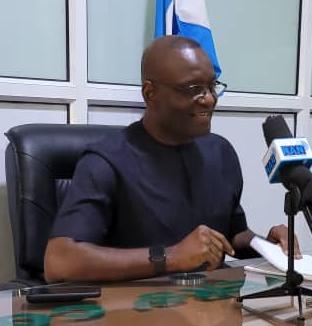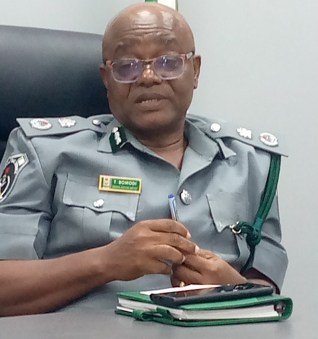Maritime
Nigerian Shippers’ Council And The PSTT Propaganda

BY EGUONO ODJEGBA
It would appear that while a number of government agencies find the need to engage in corporate propaganda, recent claim by the Nigerian Shippers’ Council (NSC) that foreign countries are already jostling to understudy and adopt the Nigeria Port Standing Task Team (PSTT) model, do not only sound extremely political, it stretches the imagination beyond reckless limit.
To begin with, PSTT as a model of operational efficiency was necessitated by our peculiar failure which is not only strange to world order but indeed negates international best practices. The sad dynamics that threw up PSTT as well indeed the prevailing conditions therefore, are essentially ours and must not be assumed to be universal.
Thus claims of European, Asian and some African nations seeking to subscribe to this model should be taken with a pitch of the salt. Such claim is not only grandiose and smacks of overdose of reckless chest beating given the challenges that still assail the blueprint in spite of its modest successes.
But to suggest that the blueprint has gained international recognition pretends to enjoy a vacuous fame of self adulation and must be regarded as a fallacy taken too far. Put in proper context, PSTT is still struggling to fully realize its terms of reference, not to talk about its shouting alleged integrity gaps.
Instructively, it admitted to critical outstanding knots and bolts that are yet to find their places afterwards of its earlier claim in question; what then is the attraction? Truth is the so-called claim of international attraction purportedly by Convention of Business Integrity (CBi) is neither here nor there, since the group and the NSC that spoke for it failed to ascribe to particular designs of the model the identified foreign countries have shown interest.
It is also important to clarify that CBi is a private business partner that specializes in services rating in Africa, but which for our purpose we dub foreign business group. When the Coordinator of PSTT, Moses Fadipe said the business integrity group informed the Vice President, Prof. Yemi Osinbajo, that the success of PSTT is attracting international appraisals, for which the VP was given an award, the presidency was perhaps simply satisfied it was receiving an award, and couldn’t be bothered about the real evaluation.
It is also on record that the Ease of Doing Business under the ubiquitous ports enabling business environment committee (PEBEC) headed by Vice President Osinbajo remains mere expressions of operational efficiencies. But let us return to PSTT and its fantastic claim.
Reports quoting Fadipe, said: “A frontline industry civil society group, Convention on Business Integrity (CBi), has been on the track with our activities. The task team and CBi have been part of a number of advocacy and action programmes that recently won the nation the first-ever ‘Outstanding Achievement in Collective Action Award’ of the Switzerland-based Basel Institute on Governance. This award was recently received by the Vice President on behalf of the Federal Government.
“Indeed, the narrative is fast changing as excitedly alluded to by the Vice President at the launch of the Process Manual in December 2020. According to the Co-founder of CBi, the success recorded is now attracting international reviews as countries such as Egypt, Ukraine and India are planning to adopt the ‘Nigerian miracle’ model to produce similar gains in their own ports’ operations.
“Through our model of establishing a real-time Anti-Corruption PSSP/ Help Desk in Nigerian Ports and ensuring that the provision of the Manual on Joint Boarding of vessels is strictly adhered to, there has been an unprecedented decline in the number of vessel infractions,
“The previous pervasive practice of slamming un-receipted charges on captains on allegations of infractions that were often fictitious has drastically reduced. This level of transparency is also being exported to terminal operations and the entire port logistic hub operations including activities on the port logistics ring,” he stated.
He said that while the reduction in vessels waiting time at Nigerian seaports has reduced significantly to which he ascribed a whooping N5.4billion cost efficiency recovery per annum yearly since PSTT came on stream, he added that from January 2021 to January 2022, $20,000 was saved daily from demurrage to foreign shipowners by Nigerian shippers.
Speaking further, he said: “implementation so far has shown progressive cost recovery in billions of naira. The economy has saved an average vessel demurrage of $20,000 per day between the years 2021 and 2022 which ultimately translated to the sum of $12,350,000 which is over N5.4 billion at today’s official exchange rate.
“More than 85% of vessels that called at Nigerian ports and terminals left without incident in 2021.”
While agreeing with Fadipe and the NSC on above, he was not as forthcoming with regards to the situation outside the ports, in terms of trucks parking, trucks call-up, traffic and traffic management?
Is the Lagos and Onne ports access roads free of traffic gridlock and maddening traffic extortions and criminalities?
It also sounds strange what the PSTT had to do with the prevention of vessels accident at the ports, which must be part of the positive ingredients in our operational manual that is attracting Asian giants like India.
While fielding questions from journalists, the PSTT boss admitted to operational challenges outside the ports which are central to the success of the port manual being implemented by it; and vowed to make touting and informal fund mobilization by non state actors disappear in 30 days; despite having avoided the monstrance in the past two years.
He says: “You have heard from stakeholders of touts everywhere and you equally heard from them that this is a task for all and not for PSTT alone. Traditional rulers, Lagos state government, security agencies are all involved. We have met with Commissioner of Transport in Lagos state. We can all do it.
“Within the ambit of the mandate of PSTT, by the grace of God, by next week, we are moving out and when we move out, you will see a tremendous change in the area of touting in the corridors mentioned. As we start from Monday, all the complaints raised in this meeting will be duly addressed in less than thirty days.
“That we have done, we can do it, we have the capacity to do so within the port logistic ring. You will see a drastic change within the next thirty days.”
The PSTT is subsumed under the supervision of the Nigerian Shippers’ Council who’s Executive Secretary/CEO, Mr. Emmanuel Jime have been around the port system for more than six years. Since assuming control of the Council, industry observers say Jime rides on fire brigade approach in responding to issues; any less he delights in appropriating successes that are results of routine system processes.
While the NSC is saddled with the development of inland dry ports and its associated infrastructures and super structures, all the facilities he inherited and which were adjudged to be over 70percent completion level have not added any significant value, while some can be said to be progressing backwards.
Even though propaganda has come handy in the above instance, decay has also set in, despite all official smokescreen to the contrary. Under Jime, the Kano Inland Dry Port which was hastily commissioned is still struggling, while the Funtua Port was through official fiat pronounced an export base. The fallacy of the Funtua Export Port is been looked into.
The PSTT is another non statutory task Jime has been saddled with, and for which he and the team driving its implementations must continually subscribe to experimental ‘gains’ some of which are farfetched.
But as long as these meets the political fantasies of the ruling class, NSC will not forebear to say that Japan, North Korea and or even Russia, have also begun to show interest in our inland ports development programme.

























